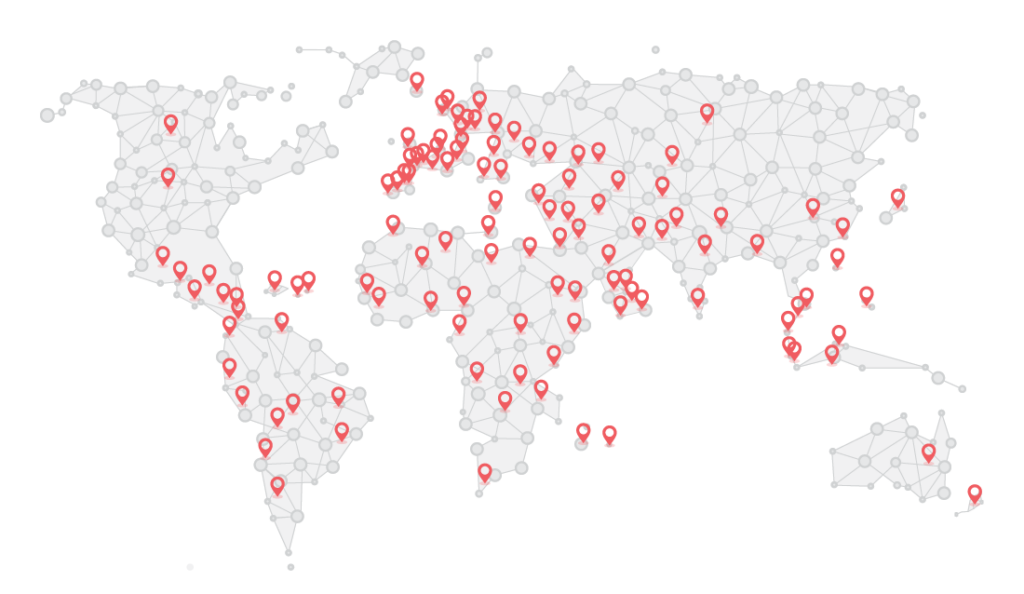We are re-imagining urban mobility in the smart cities of tomorrow.
Few investment opportunities address such a sizeable market as KERB does. KERB is a disruptive global mobility ecosystem that is activating the kerbside through technology and IoT – right across the world. We are building for the urban mobility landscape of tomorrow. Parking is just the first step.

Rapidly growing market yet to be disrupted
The global ‘smart parking’ market is projected to reach US$43bn by 2025, growing at a compound annual growth rate of 20% from 2015 to 2025. This growth is driven by a rising number of motor vehicles on the road and growing urbanisation, across the developed world and the developing world. A major cause of urban congestion is the number of vehicles searching for parking. Meanwhile, tens of thousands of private, off-street parking spaces sit empty during rush hours – in front of residential buildings, behind sports venues and beneath hotels. Until now, there has not been a platform that could unlock those spaces, in cities across the world. In parallel, the 100-year-old commercial parking industry is ripe for disruption (just as the 100-year old taxi industry was ten years ago). The parking sector has struggled to adapt to today’s world of mobile phones and the internet. COVID-19 has shone a bright light on the urgent need for change: owners and operators need data on who is on the premises, while drivers want contactless car park access.

Exponential growth potential, through unrivalled global speed to market
KERB has a nimble, capital-light approach to enable fast market-testing prior to deploying people into new markets. KERB’s technology works with existing car park infrastructure and does not require any costly or time-consuming integrations with hardware or software. Most buildings and car parks around the world can implement KERB with zero up-front cost, and KERB’s highly flexible commercial model makes it extremely compelling for commercial owners and operators seeking ways to capture driver data and get better operating margins from their car parks. KERB’s soon-to-be-published open API (with supporting documentation in 20 languages), allows organisations to pull data from KERB into their internal CRM and reporting systems.

Adaptable in a changing world
COVID-19 has accelerated the broader opportunity for KERB by several years. In a post-COVID world, identity and data will matter more. A hygiene-sensitive public is nervous about touching unsanitized ticket machines and pay stations in car parks. Drivers will increasingly expect cashless and contactless booking and access. Commercial owners and operators will have a responsibility to know who is on the premises, and when. KERB’s technology gets drivers of any type of vehicle securely into and out of a car park via the KERB app on their phones.

Data on users enables "last-mile" mobility services such as EV-charging
The places a person parks every month tell a fascinating data story about their life: where they live, work, play, pray. KERB is building towards a future where it will use the hundreds of thousands of parking spaces on its platform for other last-mile mobility services, such as EV-charging, parcel drop boxes and car-sharing spaces. KERB will roll out these kerbside services in cities right across the world.

A proprietary gate-opening hardware device that opens any parking gate
Parking gates are mechanical, not digital. There is no common standard among gate manufacturers. Most parking equipment solutions don’t have an API; those that do, require time/cost-prohibitive integrations. Large multinationals, such as car manufacturers, will gravitate towards a standard global operating system that provides the same car park access solution for their customers, wherever they need to park. The KERB Box™ hardware device, combined with the driver-facing KERB app, is the key to unlocking the opportunity for KERB to scale globally.
Global from day one

A Solution for Smart Cities
On July 1, 2021, KERB was announced as the joint-winner of Toyota Mobility Foundation’s USD1.5m ‘City Architecture for Tomorrow’ global challenge, ahead of 90+ technology companies and university research departments from around the world. Toyota’s objective: to drive intelligent data-driven, connected solutions towards more efficient, innovative, secure and sustainable cities.
The “mobility-for-all” solution, which KERB presented to the ‘City Architecture for Tomorrow’ panel of judges, is today being deployed in the city of Kuala Lumpur, Malaysia, a co-sponsor of the competition.
Learn more about the KERB opportunity
If you believe in the global opportunity that KERB represents, and are someone who understands the value, proposition and economics of a ‘platform-play’ like KERB, we want to hear from you. Please fill out this form and let us know about your potential investment in KERB.






